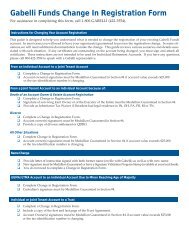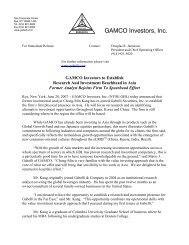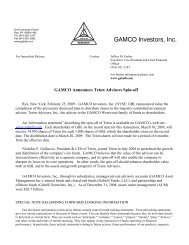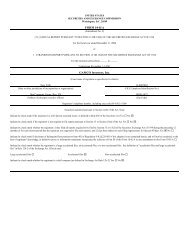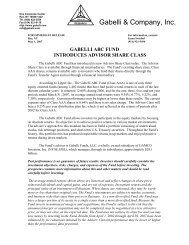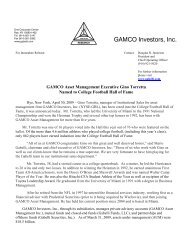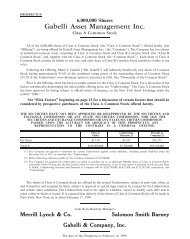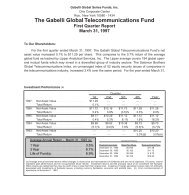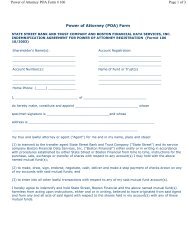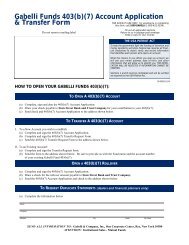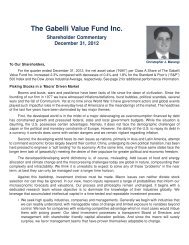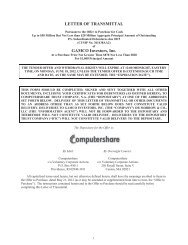Statement of Additional Info - Gabelli
Statement of Additional Info - Gabelli
Statement of Additional Info - Gabelli
Create successful ePaper yourself
Turn your PDF publications into a flip-book with our unique Google optimized e-Paper software.
A Fund’s primary risk is that if the seller defaults, the proceeds from the disposition <strong>of</strong> underlying securities and other<br />
collateral for the seller’s obligation would be less than the repurchase price. If the seller becomes bankrupt, a Fund might<br />
be delayed in selling the collateral. Under the 1940 Act, repurchase agreements are considered loans. Repurchase<br />
agreements usually are for short periods, such as one week or less, but could be longer.<br />
A Fund will not enter into repurchase agreements <strong>of</strong> a duration <strong>of</strong> more than seven days if, taken together with restricted<br />
securities and other securities for which there are no readily available quotations, more than 15% <strong>of</strong> its net assets would<br />
be so invested.<br />
Borrowing (All Funds). Each Fund (i) may borrow money from banks, but only for temporary or emergency (not<br />
leveraging) purposes, in an amount up to 5% <strong>of</strong> the value <strong>of</strong> its total assets (including the amount borrowed) valued at the<br />
lesser <strong>of</strong> cost or market value, less liabilities (not including the amount borrowed) at the time the borrowing is made and<br />
(ii) may pledge, hypothecate, mortgage, or otherwise encumber its assets, but only in an amount up to 10% <strong>of</strong> the value <strong>of</strong><br />
its total assets to secure borrowings for temporary or emergency purposes, or up to 20% in connection with the purchase<br />
and sale <strong>of</strong> put and call options.<br />
Bank Obligations (All Funds). Time deposits are non-negotiable deposits maintained in a banking institution for a<br />
specified period <strong>of</strong> time (in no event longer than seven days) at a stated interest rate. Time deposits which may be held<br />
by a Fund will not benefit from insurance from the Bank Insurance Fund or the Savings Association Insurance Fund<br />
administered by the Federal Deposit Insurance Corporation ("FDIC"). Certificates <strong>of</strong> deposit are certificates evidencing<br />
the obligation <strong>of</strong> a bank to repay funds deposited with it for a specified period <strong>of</strong> time. Bankers' acceptances are credit<br />
instruments evidencing the obligation <strong>of</strong> a bank to pay a draft drawn on it by a customer. These instruments reflect the<br />
obligation both <strong>of</strong> the bank and <strong>of</strong> the drawer to pay the face amount <strong>of</strong> the instrument upon maturity.<br />
Commercial Paper (All Funds). Commercial paper includes short term unsecured promissory notes, variable rate<br />
demand notes, and variable rate master demand notes issued by domestic and foreign bank holding companies,<br />
corporations, and financial institutions (see "Variable and Floating Rate Demand and Master Demand Notes" below for<br />
more details) as well as similar taxable and tax-exempt instruments issued by government agencies and instrumentalities.<br />
Each Fund establishes its own standards <strong>of</strong> creditworthiness for issuers <strong>of</strong> such instruments.<br />
Certificates Of Deposit (All Funds). Domestic commercial banks organized under federal law are supervised and<br />
examined by the Comptroller <strong>of</strong> the Currency and are required to be members <strong>of</strong> the Federal Reserve System and to have<br />
their deposits insured by the FDIC. Domestic banks organized under state law are supervised and examined by state<br />
banking authorities but are members <strong>of</strong> the Federal Reserve System only if they elect to join. In addition, state banks<br />
whose certificates <strong>of</strong> deposit (“CDs”) may be purchased by the Funds are insured by the FDIC (although such insurance<br />
may not be <strong>of</strong> material benefit to a Fund, depending upon the principal amount <strong>of</strong> the CDs <strong>of</strong> each bank held by the Fund)<br />
and are subject to federal examination and to a substantial body <strong>of</strong> federal law and regulation. As a result <strong>of</strong> federal or<br />
state laws and regulations, domestic banks, among other things, generally are required to maintain specified levels <strong>of</strong><br />
reserves, limited in the amounts which they can loan to a single borrower and subject to other regulations designed to<br />
promote financial soundness.<br />
The Funds may purchase CDs issued by banks, savings and loan associations, and similar institutions with less than one<br />
billion dollars in assets, which have deposits insured by the Bank Insurance Fund or the Savings Association Insurance<br />
Fund administered by the FDIC, provided a Fund purchases any such CD in a principal amount <strong>of</strong> no more than<br />
$100,000, which amount would be fully insured by the FDIC. Interest payments on such a CD are not insured by the<br />
FDIC. A Fund would not own more than one such CD per issuer.<br />
Other Mutual Funds (All Funds). Each Fund may invest in shares <strong>of</strong> other management investment companies, subject<br />
to the limitations <strong>of</strong> the 1940 Act, or any exemptive order issued thereunder, and subject to such investments being<br />
consistent with the overall objective and policies <strong>of</strong> the Fund making such investment, provided that any such purchases<br />
will be limited to short term investments in shares <strong>of</strong> unaffiliated investment companies. The purchase <strong>of</strong> securities <strong>of</strong><br />
other mutual funds results in duplication <strong>of</strong> expenses such that investors indirectly bear a proportionate share <strong>of</strong> the<br />
expenses <strong>of</strong> such mutual funds including operating costs, and investment advisory, and administrative fees.<br />
Corporate Debt Securities (All Funds). A Fund's investments in corporate debt may include U.S. dollar or foreign<br />
currency-denominated corporate bonds, debentures, notes, and other similar corporate debt instruments <strong>of</strong> domestic and<br />
foreign issuers, which meet the minimum ratings and maturity criteria established for each Fund under the direction <strong>of</strong> the<br />
5



